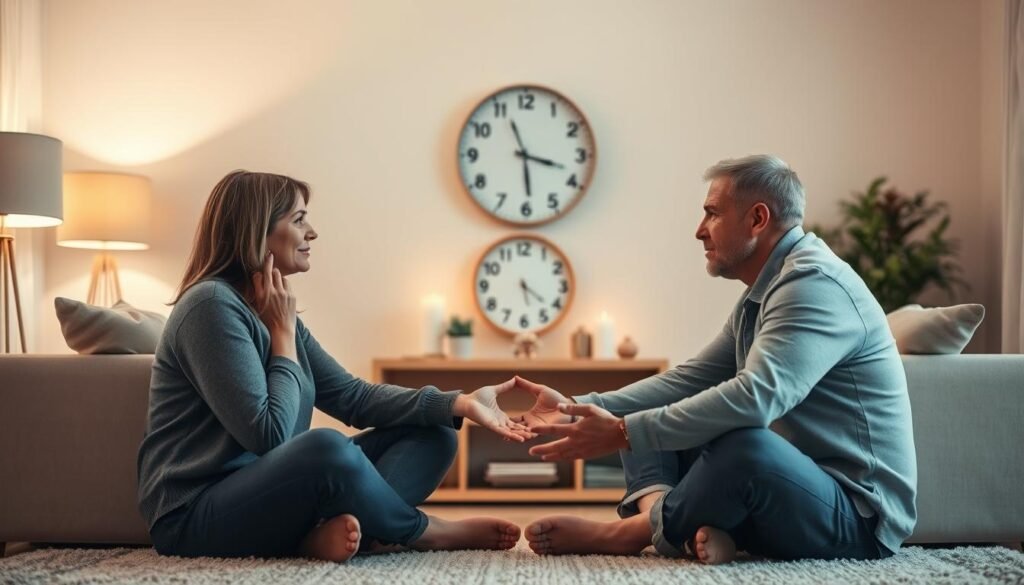Did you know some people spend over three hours daily worrying about their relationships? This fact shows how common relationship anxiety is. It affects one’s mental and emotional health. Therapy for Relationship Anxiety helps in building trust and finding peace.
Many couples face trust issues that lead to emotional ups and downs. Seeking therapy provides a way to heal. Trust Mental Health offers supportive care, highlighting the need to tackle relationship anxiety for better emotional bonds.
Key Takeaways
- Relationship anxiety often leads to chronic worry about trust within relationships.
- Therapy sessions are crucial for addressing and mitigating these anxiety-related issues.
- Acceptance and Commitment Therapy (ACT) and Exposure and Response Prevention (ERP) are effective in overcoming anxiety.
- Couples therapy can lead to noticeable improvement in trust issues within approximately six months.
- Rebuilding trust encompasses new communication, vulnerability, and established boundaries.
- Relationship anxiety is a universal experience, affecting individuals across all demographics.
Understanding Relationship Anxiety
Relationship anxiety brings intense worry and fear about connections with others. Those who feel it often deal with emotional insecurity. They doubt their partner’s love and the solidity of the relationship. It’s key to tackle these feelings early. They can lead to deep emotional pain and affect happiness.
Definition of Relationship Anxiety
This anxiety is marked by constant overthinking and unease. It makes enjoying relationships hard. Sufferers may doubt themselves and need constant reassurance. They worry about their partner’s faithfulness and fear break-ups. Many hide their true feelings, making open communication tough.
Common Symptoms and Signs
Knowing the signs of relationship anxiety helps in dealing with it. Common symptoms include:
- Questioning one’s importance to their partner
- Doubting the partner’s dedication and feelings
- Worrying about the future of the relationship
- Feeling physically nervous or unwell around the partner
- Having ongoing worries about staying together
People might also start fights, push limits, or ignore problems because they feel insecure. It’s crucial to face emotional insecurity and these symptoms. Doing so leads to stronger, healthier relationships and emotional well-being.
What Triggers Relationship Anxiety?
It’s key to know what causes relationship anxiety to manage it better. Different things lead to this issue, affecting how people see and act in their relationships.
Childhood Experiences
Childhood plays a big part in adult emotions. How we attached to those who cared for us influences our behaviors in love. For example, kids who didn’t always get consistent care may fear being left or not trust easily as adults.
Low Self-Esteem and Personal Insecurities
Feeling bad about oneself deeply affects relationship worries. People might think they’re not good enough for their partner. They fear being replaced. This worry can make them act in ways that hurt the relationship, like making a big deal out of small things. This can push partners away and damage trust.
Fear of Loss and Abandonment
Being scared of being left alone can come from being hurt before. Those who’ve been betrayed or lost someone might always be on guard. They often worry about their partner leaving. This stress can cause both emotional and physical signs, like feeling nervous or sweating. It makes handling emotions hard.
Impact of Anxious Attachment on Relationships
Attachment styles play a big role in how we form relationships. People with anxious attachment often face emotional challenges in their relationships. It’s important to understand this to grow personally and improve our connections with others.
How Attachment Styles Affect Connections
Anxious attachment affects about 20% of people. They need a lot of reassurance and love. This need can make them clingy and very aware of their partner’s feelings. They fear being rejected and may put their partner’s needs before their own to feel secure.
Recognizing Anxious Attachment Patterns
It’s key to identify anxious attachment signs for better relationships. Feeling threatened when a partner seems distant or forgetting important events can stir up fear. This reaction often comes from inconsistent care in childhood, making it hard to handle emotions.
Good communication helps reduce the impact of anxious attachment. Talking about feelings without overwhelming their partner helps strengthen their bond. Being with a securely attached partner can also help, as it fosters trust and emotional growth.
| Behavior | Description |
|---|---|
| Clinginess | Constant need for reassurance and proximity to a partner. |
| Hypervigilance | Heightened sensitivity to partner’s emotional states, leading to anxiety. |
| People-pleasing | Prioritizing partner’s needs over personal wellbeing, seeking approval. |
| Jealousy | Feeling threatened by perceived distance or attention to others. |
| Insecurity | Lack of trust in the relationship, driven by past experiences. |
Understanding and working through anxious attachment can lead to better relationships. It opens the door for personal growth and finding emotional security.
Therapy for Relationship Anxiety
There are different ways to tackle Relationship Anxiety in therapy. Techniques like Cognitive Behavioral Therapy (CBT), emotion-focused therapy, and mindfulness can help. These methods can make a big difference in how people handle anxiety in love.
Types of Therapeutic Approaches
We have some key therapy types for relationship anxiety:
- Cognitive Behavioral Therapy (CBT) aims to change negative thoughts. This can ease anxiety and help see relationships in a better light.
- Emotion-focused therapy allows couples to deeply understand their feelings. This builds a strong emotional support system between them.
- Mindfulness techniques help individuals notice their thoughts and feelings. This reduces anxiety and helps them be more present with their partners.
Couples counseling is very important here. It lets partners talk about their feelings, communicate better, and set healthy limits. They learn about each other’s needs and fears. This supports them in addressing issues of dependency and boosts happiness in the relationship. You can learn more about cognitive methods by checking out CBT for relationship anxiety.
Benefits of Seeking Professional Help
Getting professional help has many benefits for those facing relationship anxiety. It includes:
- Improving self-recognition and emotional understanding in relationship issues.
- Giving tools to better handle anxiety and boost talking skills.
- Providing a secure place to talk about fears and soft spots.
Studies show people with anxiety struggles find it hard to keep relationships healthy. Therapy can improve this. Going to sessions regularly can change how partners interact. This builds trust and steadiness. Overcoming relationship anxiety is hard, but with professional advice, couples can face their troubles and grow together.

Building Trust and Healthy Boundaries
Trust is key in any strong relationship. It lets people share their needs and expectations safely. This builds emotional security. When both partners understand and respect each other’s boundaries, they encourage open talks and closeness. Trust is vital for relationships to flourish. It makes a safe space where both can grow.
Importance of Trust in Relationships
Building trust is crucial for emotional security in relationships. Without trust, relationships may suffer, leading to unresolved issues. With trust, partners are open and vulnerable, strengthening their bond. Trust helps people believe in their partner’s intentions, supporting growth and closeness.
Strategies for Establishing Healthy Boundaries
Setting healthy boundaries takes effort and understanding. Here are some good strategies:
- Open Communication: Promote clear talks about feelings and expectations. It lets partners express their needs without fear.
- Recognizing Emotional Triggers: Knowing what causes anxiety or discomfort helps in setting protective boundaries.
- Practicing Self-Soothing Techniques: Self-care routines can reduce overwhelm and improve emotional stability.
- Respect for Each Other’s Boundaries: It’s important for partners to respect each other’s limits, building a culture of trust.
- Adaptability: Being open to changing boundaries as the relationship grows is key to meeting both partners’ needs.
Establishing boundaries and trust leads to a strong, fulfilling relationship. It ensures emotional security and reduces conflicts. Therapy, like that from New Directions Mental Health, can help develop these important skills.
| Type of Boundary | Description | Benefits |
|---|---|---|
| Physical | Defines personal space and physical contact limits. | Encourages comfort and safety during interactions. |
| Emotional | Sets limits on emotional attachment and support. | Promotes respect and reduces anxiety. |
| Time | Allocates personal time for individual interests. | Improves self-care and prevents burnout. |
| Digital | Defines online interaction and privacy expectations. | Protects personal info and decreases anxiety. |
Effective Communication Skills for Couples
Good communication is key in strong relationships. Couples often hit snags like barriers to communication. These can block understanding and closeness. Misunderstanding tone, making assumptions, and a rush of emotions may cause conversations to fail. Noticing these problems is the first step in fixing them.
Common Communication Barriers
There are many things that can make communication tough for couples. Here are some usual roadblocks:
- Misinterpretation of tone or intent
- Emotional exhaustion
- Assumptions about partner’s feelings
- Lack of active listening skills
Overcoming these barriers helps lower stress in relationships. It lets couples share their thoughts and needs freely. A 2013 study by Mark & Jozkowski found that college-aged couples who communicate well tend to be happier together.
Techniques to Enhance Understanding
In couples counseling, certain methods are taught to improve talking and listening. Some useful strategies are:
- Active listening, which means truly hearing and showing you get the other person’s feelings.
- Using “I” statements to talk about your feelings, which helps avoid making the other person defensive.
- Working together to find solutions, which boosts teamwork and support.
- Using body language, like gestures and facial expressions, to show more emotion.
Using these methods can greatly boost communication skills. Mental health experts often stress the need for supportive, non-judgmental attitudes in therapy. Good communication solves problems, builds trust, and deepens love. This leads to a healthier and happier relationship. For more help in improving your communication, check out communication exercises for couples for tips and advice.

Role of Couples Counseling in Healing
Couples counseling is essential for partners wanting to fix conflicts and feel closer. It helps them boost their happiness together. Those facing repeated fights or feeling distant might find it helpful. They should seek this therapy before things get worse.
When to Seek Couples Counseling
Signs you might need couples counseling include:
- Persistent arguments that seem unresolvable
- Lack of emotional intimacy and connection
- Significant life changes or stressors impacting the relationship
- Feelings of dissatisfaction or unhappiness within the partnership
How Couples Counseling Differs from Individual Therapy
Couples counseling and individual therapy are different. The first focuses on both people working together. They concentrate on understanding each other and working as a team. In contrast, individual therapy is all about you. It’s about growing personally.
In couples counseling, both partners attend sessions together. This is unlike individual therapy, where you go alone. The goal is to fix the relationship and improve how you work together. Eventually, this helps bring back trust and closeness.
Studies show couples counseling does more than fix issues. It makes relationships stronger and happier. When seeking therapy, couples learn to connect deeper. They learn to face problems as a team.
Overcoming Fear of Intimacy
The fear of intimacy can stop emotional connections in relationships. People like Jenna and Ethan hesitate to share due to past hurts. This makes it hard to form close bonds. Understanding this fear of vulnerability means looking at the parts involved. These include the unknown, opening up emotionally, and the dangers of showing one’s true self.
Understanding the Fear of Vulnerability
Being vulnerable is key to a strong bond. It means facing doubts and accepting feelings. Many find therapy helpful to beat negative thoughts and feelings of not being good enough. Fear of being left alone often ties back to mental health issues. It can come from being neglected or unstable relationships in childhood.
Steps to Cultivating Intimacy
To beat fear of intimacy, people can try these steps:
- Recognize the fear and where it comes from.
- Make goals to be more open in safe situations.
- Fight thoughts that keep you closed off.
- Seek therapy or support groups for emotional obstacles.
- Imagine having a relationship where you’re open and honest.
Healthy relationships are possible when we think we’re worth loving. Trying community events can help meet others and fight loneliness. This can help reduce fear of intimacy. To learn more about boosting mental health, explore resources that encourage emotional connection.

Practical Strategies for Coping with Relationship Anxiety
Effective ways to handle relationship anxiety include mindfulness and self-soothing. These methods help manage intense emotions. They improve your connection with your partner.
Mindfulness and Self-Soothing Techniques
Practicing mindfulness, like meditation and grounding, lowers anxiety. Studies show they can reduce relationship anxiety by 25%. Writing in a journal helps you explore and understand your feelings. It leads to knowing what triggers your emotions. When you’re mindful, you can keep your feelings and actions separate. This makes it easier to deal with tough times in your relationship.
Building a Support System
Having a supportive network is key for people with relationship anxiety. Family and friends offer encouragement during hard times. About 40% of those with this anxiety tend to always try to please others, sometimes forgetting their own needs. Setting limits and getting support from loved ones help balance relationships. Advice from experts at Dr. Dawn Johnson & Associates points out the importance of self-esteem and social connections for mental health. These emotional tools help trust and happiness grow in your relationship.
Check out this link for more on relationship anxiety causes and solutions. Knowing why it happens is the first step to better relationships.
Conclusion
Therapy plays a big role in building secure connections and helping with emotional healing. It helps people understand the root of their anxiety. They learn how to face their fears and grow personally and in relationships.
A lot of people with relationship anxiety, about 68%, often doubt their partner’s love. Around 55% feel a strong need for reassurance. This shows why professional help is key to overcoming these issues.
Experts like Dr. Courtney show that therapy has an 82% success rate. Mindfulness and self-care help reduce anxiety. They make people feel better about themselves. This leads to healing and stronger, trusting relationships.
Tackling relationship anxiety with a therapist’s help leads to clearer emotions and closer connections. By looking after one’s well-being and handling anxiety, people create lasting, trusting relationships. These steps bring happier relationships and a positive emotional future.